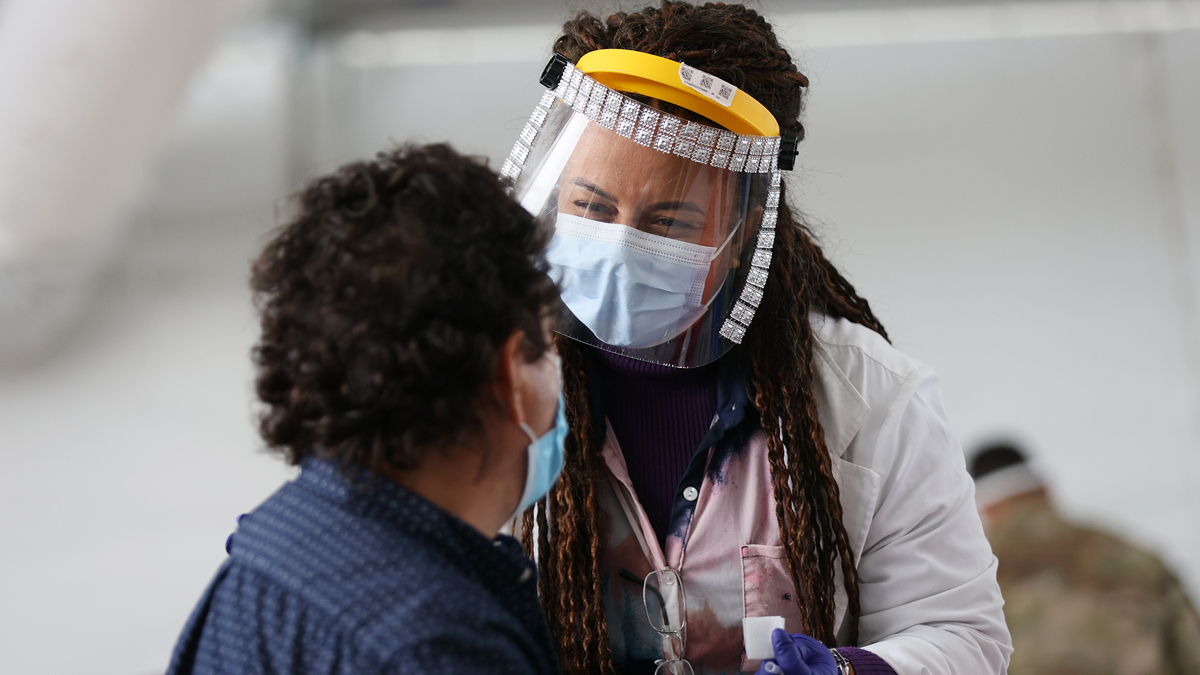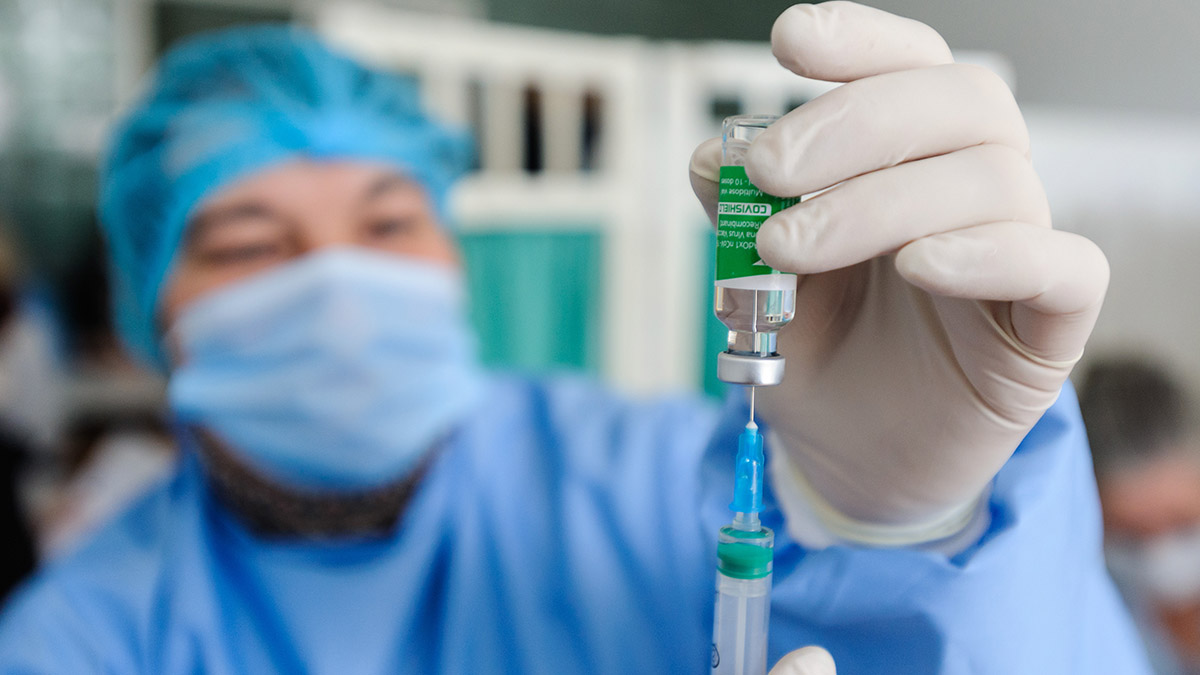When can you get the COVID vaccine in Illinois?
Eligibility will expand to all residents over the age of 16 outside of Chicago in April, Gov. J.B. Pritzker has announced. But residents with certain underlying conditions as well as some essential workers are already eligible.
Most of Illinois is currently under Phase 1B Plus guidelines, but the state opened eligibility to more essential workers who were not previously qualified for the vaccine on Monday.
Also Monday, Chicago entered Phase 1C, opening up vaccinations to more essential workers and Chicago residents with certain health conditions. The city had previously chosen not to move into Phase 1B Plus with the rest of the state.
Feeling out of the loop? We'll catch you up on the Chicago news you need to know. Sign up for the weekly Chicago Catch-Up newsletter here.
The city and state operate on separate timetables because Chicago receives its supply of vaccine from the federal government allocated separately from the state.
Here's a look at who is eligible to get the vaccine:
Eligible in Chicago and Illinois under Phases 1A and 1B
- Health care workers
- Long-term care facility staff and residents
- Residents age 65 and over
- Frontline essential workers, which means "residents who carry a higher risk of COVID-19 exposure because of their work duties, often because they are unable to work from home, and/or they must work closely to others without being able to socially distance. This includes:
- First responders: Fire, law enforcement, 911 workers, security personnel, school officers
- Education: Teachers, principals, student support, student aids, day care worker
- Food and agriculture: Processing, plants, veterinary health, livestock services, animal care
- Manufacturing: Industrial production of good for distribution to retail, wholesale or other manufactures
- Corrections workers and inmates: Jail officers, juvenile facility staff, workers providing in-person support, inmatesU
- USPS workers
- Public transit workers: Flight crew, bus drivers, train conductors, taxi drivers, para-transit drivers, in-person support, ride sharing services
- Grocery store workers: Baggers, cashiers, stockers, pickup, customer service
- Shelters and day care staff: Homeless shelter, women’s shelter, adult day/drop-in program, sheltered workshop, psycho-social rehab
Eligible now in Illinois outside of Chicago (some of these categories are included in Chicago's Phase 1C)
- Residents with the following high-risk medical conditions:
- Cancer, chronic kidney disease, COPD (Chronic Obstructive Pulmonary Disease), diabetes, heart condition, immunocompromised state from a solid organ transplant, smoking, obesity, pregnancy, pulmonary disease, Sickle Cell Disease
- Higher education staff
- Government workers
- Media
- Restaurant staff
- Construction trade workers
- Religious leaders
Eligible now in Chicago's Phase 1C
- Residents with the following underlying medical conditions:
- Cancer (current diagnosis), Cardiac, cardiovascular, and cerebrovascular disorders (including heart disease, coronary artery disease, and hypertension or high blood pressure), Chronic Kidney Disease, Chronic respiratory disorders (including cystic fibrosis, moderate to severe asthma, pulmonary fibrosis, and chronic obstructive pulmonary disease/emphysema [COPD]), Diabetes (Type 1 and Type 2), Disability: physical, developmental, visual, hearing, or mental, Neurologic conditions (including dementia), Down Syndrome, Immunocompromised state (weakened immune system) including from blood or bone marrow transplant, immune deficiencies, HIV, use of corticosteroids, or use of other immune weakening medicines, Liver disease (including hepatitis), Pregnancy, Obesity: BMI ≥30 kg/m2, Schizophrenia spectrum disorders, Sickle Cell Disease, Thalassemia, persons with disabilities
- Clergy and religious organizations: People 65 years of age and older; where possible, prioritizing Chicagoans 75 years and older and Chicagoans age 65-74 with underlying medical conditions
- Energy: Workers supporting the energy sector, including those involved in energy manufacturing, distribution, repair
- Finance: Banks; currency exchanges; consumer lending; credit unions; appraisers; title companies; financial markets; financial institutions; institutions that sell financial services; accounting services, and insurance services
- Food and beverage service: Restaurant and other facilities that prepare and serve food (including bars); entities that provide food services
- Higher education: Workers in educational institutions – including junior colleges, four-year colleges, and universities, technical schools, trade schools, educational support services, and administration of education programs
- Information technology and communications: Internet, video and telecommunications systems, consumer electronics repair, computer and office machine repair
- Legal: Workers providing legal services or supporting the operations of the judicial system, including judges, lawyers, paralegals, legal assistants, process servers, couriers, bail bond agents, parole officers, probation offices, court personnel, and others providing legal assistance or performing legal functions
- Media: Newspapers, periodicals, television, radio, and other media services, news dealers and newsstands, broadcasting, news syndicates, printing, and book publishers. Other community- or government-based operations and essential functions. Other governmental employees; community based essential functions (e.g. urban planning, offices that provide basic needs such as food, childcare, shelter, and social services); workers in libraries
- Personal care services and hygiene: Businesses that provide personal care services, such as hair, nails, and non-medical massage. Laundromats, dry cleaners, industrial laundry services, and laundry service providers
- Public health: Public health entities; pharmaceutical, medical device and equipment, and biotechnology companies
- Public safety: Workers that ensure public safety systems function properly, including building inspectors, civil engineers, chemical engineers, aerospace engineers and hazardous materials responders. Workers who construct and maintain roads, highways, railroads, and ports. Cybersecurity operations workers
- Retail: Workers in retail stores including but not limited to stores that sell alcoholic and non-alcoholic beverages, medication not requiring a medical prescription, other non-grocery products (e.g. electronics, optical goods, books, etc.), other household consumer products, wholesalers, licensed cannabis dispensaries and cultivation centers
- Shelter and housing: Hardware stores and businesses; construction and maintenance of buildings, real estate; hotel and motel workers
- Transportation and logistics: Workers at gas stations; auto and bike supply and repair; businesses that supply shipping and delivery services; couriers; warehouses; private mail; Airline workers not included in 1b; workers in rail, water, truck, charter bus transportation or transportation rental
- Water and wastewater: Workers involved in wastewater treatment and operations; sanitary and storm maintenance crews performing emergency and essential maintenance of systems
Eligible now in Chicago
Seniors and people who live in now 17 ZIP codes in Chicago and have health conditions can register for a COVID vaccine appointment at the United Center mass vaccination site.
Limited appointments for the site are currently only open to seniors age 65 and up as well as residents of "vulnerable, under-vaccinated ZIP codes" who have underlying conditions, the city says. Those ZIP codes are: 60608, 60609, 60619, 60620, 60621, 60623, 60624, 60628, 60629, 60632, 60636, 60639, 60644, 60649, 60651, 60652, 60653.
Seniors and eligible residents of those ZIP codes can book appointments by calling (312) 746-4835 between 8 a.m. to 8 p.m. Monday through Saturday and 8 a.m. to 4 p.m. on Sunday. Targeted outreach is also being done in those communities to help register residents, per the Chicago Department of Public Health.
Anyone who books an appointment but does not qualify, either as a senior or because they live in one of those ZIP codes, will have their appointments canceled, the city says.
Eligible April 12 in Illinois but not in Chicago
- All residents over the age of 16
All vaccinations will remain by appointment only, officials said, noting that "making an appointment to receive a shot may take time."
Pritzker's office also noted that residents who are not currently eligible to receive the vaccine cannot yet schedule an appointment for a future date, asking for patience in the days and weeks after April 12 as appointments "may be limited."
For a complete look at where and how you can make an appointment in Illinois or where you can receive vaccine information for your area, click here.




